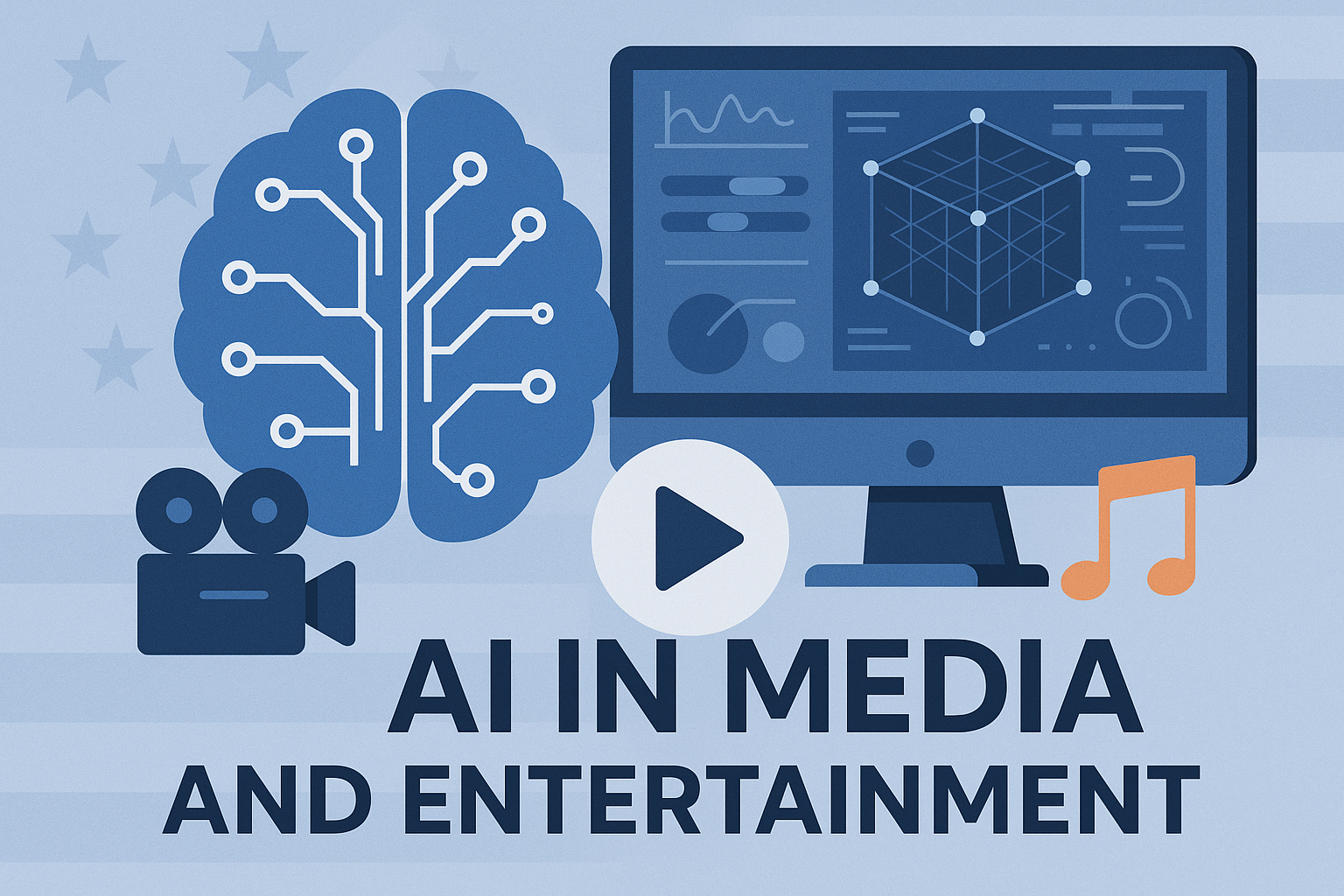
AI in Media and Entertainment: 2025 Trends, Benefits, and Top Use Cases
Artificial Intelligence (AI) is revolutionizing the media and entertainment industry in the United States. From content creation to audience engagement, AI-driven solutions are transforming how media companies operate, deliver value, and compete in a rapidly evolving landscape. This comprehensive guide explores the latest trends, benefits, and top use cases of AI in media and entertainment for 2025.
Understanding AI in Media and Entertainment
AI in media and entertainment refers to the integration of machine learning, natural language processing, computer vision, and other AI technologies into the creation, distribution, and consumption of content. These innovations are reshaping everything from film production to personalized recommendations on streaming platforms.
Why AI Matters in the U.S. Media and Entertainment Industry
The U.S. media and entertainment sector is one of the largest in the world, generating over $800 billion annually as of 2025. With increasing competition and shifting consumer behaviors, AI offers:
- 📈 Enhanced efficiency in content production and distribution
- 🎯 Hyper-personalized user experiences
- 💡 Data-driven decision-making for content strategy
- 💰 Cost savings and revenue growth opportunities
TIP: Embracing AI is no longer optional for U.S. media companies aiming to stay relevant and competitive in 2025.
Top 10 AI Use Cases in Media and Entertainment (2025)
AI is being leveraged across the industry in diverse and innovative ways. Here are the top 10 use cases ranked by impact and adoption in the U.S. market:
- Personalized Content Recommendations
- Automated Video and Audio Editing
- AI-Generated Content (Text, Music, Art)
- Deepfake and Synthetic Media Creation
- Audience Analytics and Sentiment Analysis
- Automated Subtitling and Translation
- Targeted Advertising Optimization
- Content Moderation and Compliance
- Virtual Influencers and Digital Avatars
- Interactive Storytelling and Gaming
Side-by-Side Comparison Table: Top 10 AI Use Cases
| Rank | Use Case | Key Benefit | Example Application |
|---|---|---|---|
| 1 | Personalized Content Recommendations | Boosts user engagement | Streaming platforms |
| 2 | Automated Video and Audio Editing | Reduces production time | Newsrooms, film studios |
| 3 | AI-Generated Content | Scales creative output | Music, scripts, artwork |
| 4 | Deepfake and Synthetic Media Creation | Enables new creative possibilities | Visual effects, marketing |
| 5 | Audience Analytics & Sentiment | Informs content strategy | Social media monitoring |
| 6 | Automated Subtitling & Translation | Expands global reach | Multilingual streaming |
| 7 | Targeted Advertising Optimization | Increases ad revenue | Digital ad platforms |
| 8 | Content Moderation & Compliance | Ensures brand safety | Social networks, forums |
| 9 | Virtual Influencers & Digital Avatars | Engages younger audiences | Social campaigns, gaming |
| 10 | Interactive Storytelling & Gaming | Enhances user immersion | Video games, AR/VR experiences |
Key Benefits of AI in Media and Entertainment
1. Enhanced Content Personalization
AI algorithms analyze viewer preferences, watch history, and behavior to deliver tailored recommendations. This keeps users engaged longer and increases subscription retention rates.
2. Streamlined Production Workflows
Automated editing tools powered by AI can:
- 📦 Cut raw footage into highlight reels
- 🎵 Sync music and sound effects automatically
- 📝 Generate scripts and storyboards
3. Improved Audience Insights
AI-driven analytics platforms process massive volumes of data from social media, streaming, and user feedback to uncover trends and sentiment, guiding content creation and marketing strategies.
4. Cost and Time Savings
By automating repetitive tasks such as editing, subtitling, and moderation, media companies can reallocate resources to higher-value creative work.
5. New Creative Possibilities
Generative AI models can compose music, write scripts, and even create digital actors, opening up unprecedented avenues for storytelling and artistic expression.
TIP: Use AI to augment—not replace—human creativity for the best results in content innovation.
AI-Powered Content Creation: How It Works
AI is now capable of generating high-quality content across multiple formats:
- Text: Natural language generation tools write news articles, sports summaries, and even movie scripts.
- Music: AI composes original scores based on mood, genre, or user input.
- Visuals: Computer vision creates artwork, special effects, and even photorealistic digital humans.
# Example: Simple AI script for generating a movie synopsis
import openai
prompt = "Generate a synopsis for a sci-fi movie set in 2050 about AI and humanity."
response = openai.Completion.create(
engine="text-davinci-003",
prompt=prompt,
max_tokens=100
)
print(response.choices[0].text.strip())
Challenges and Considerations for AI in Media and Entertainment
While AI offers significant advantages, there are important challenges to address:
- Ethical Concerns: Deepfakes and synthetic media can be misused for misinformation.
- Bias and Fairness: AI models may perpetuate existing biases in content recommendations or moderation.
- Copyright and Ownership: Determining rights for AI-generated content remains a legal gray area.
- Job Displacement: Automation may impact traditional roles in editing, writing, and production.
TIP: Establish clear ethical guidelines and transparency around AI use to build trust with audiences.
The Future of AI in Media and Entertainment: 2025 and Beyond
The next wave of AI innovation in U.S. media and entertainment will focus on:
- Real-time interactive experiences (e.g., live sports analysis, choose-your-own-adventure streaming)
- Hyper-personalized advertising tailored to individual viewers
- AI-driven creative collaboration between humans and machines
- Advanced content protection using AI to detect piracy and copyright infringement
Conclusion
AI in media and entertainment is reshaping the U.S. industry in 2025, driving efficiency, creativity, and audience engagement to new heights. From personalized recommendations and automated editing to AI-generated content and advanced analytics, the benefits are clear for companies willing to embrace these technologies. However, ethical considerations, transparency, and a focus on augmenting human creativity remain crucial for long-term success. As AI continues to evolve, media and entertainment professionals who leverage its power responsibly will lead the way in delivering innovative, engaging, and relevant content for American audiences.